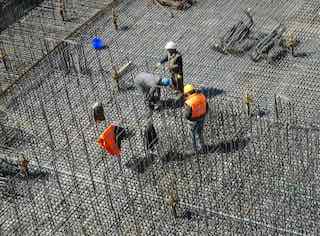
Are construction workers essential? It depends.
The standards for what constitutes essential work under COVID-19 pandemic rules vary state to state, city to city, and, in some cases, hour to hour.
Some orders change because of industry pressure; some change as the pandemic worsens; and some governors clarify earlier orders when confusion ensues.
The result has been a confounding patchwork of rules that have left some workers befuddled and industry organizations scrambling for guidance. Governors and local officials face the difficult task of trying to balance public safety with the huge hit to the economy from shuttered businesses.
The federal government has a list of essential critical infrastructure, including jobs, industries and other services. Most states use it as a baseline, but within those broad guidelines, officials set rules and tailor directives to their state and local needs.
Construction goes on in several states; others stopped it, except for auxiliary hospitals and coronavirus testing sites. Some states allowed golf courses to stay open; some closed them. New Jersey’s links initially were open but now are shut.
Can flowers be delivered? Depends. In Pennsylvania, medical marijuana dispensaries are OK, but not liquor stores (except for beer).
“Some construction is essential, right? To keep the place running. But nonessential construction is going to be stopped.”
Gov. Andrew Cuomo (D), New York
In New York, Gov. Andrew Cuomo, a Democrat, declared construction projects essential. After an outcry from workers and bad publicity about luxury apartment construction continuing, he modified the plan.
“We’re closing down nonessential construction sites,” Cuomo told reporters last week. “Some construction is essential, right? To keep the place running. But nonessential construction is going to be stopped.”
In San Francisco, Mayor London Breed stopped nonessential construction, but California Gov. Gavin Newsom’s rules for statewide projects remain fuzzy. (Both are Democrats.) The governor allowed workers who “support the construction, operation, inspection, and maintenance of construction sites and construction projects (including housing construction).”
At least three states — New York, Pennsylvania and Washington — halted almost all construction. Local jurisdictions canceled work on some projects, according to the North American Building Trades Unions, which is keeping a tally.
The national building unions in a letter urged 55 state, tribal and territorial governments to keep construction going and critical infrastructure operational.
“We can do this safely. We can work spread apart,” said Robbie Hunter, president of the State Building and Construction Trades Council of California, adding that he had instructed workers not to labor in close quarters.
He said construction officials banned lunch carts where workers often congregate and many are checking workers’ temperature at sites.
“If there’s no work, there’s no paycheck,” he added. “We are doing a real balance. I don’t want any construction worker to carry anything home to their kids.”
Stateline, an initiative of The Pew Charitable Trusts.


